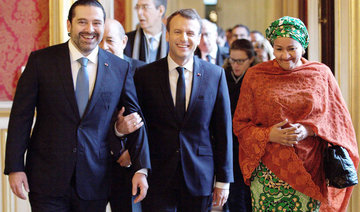BEIRUT: The main takeaway from 2017 for Lebanon was that Hezbollah’s involvement in various conflicts in the region — and the group’s huge domestic influence — poses a serious threat to the country’s relationships with Arab states. In fact, if it were not for the international consensus that Lebanon’s stability and security must be maintained, the country would likely have slipped into the pit on the edge of which it is still standing as we enter 2018.
The year began with a Saudi-Lebanon summit between President Michel Aoun and King Salman in Riyadh. In his first official trip outside of Lebanon, Aoun was attempting to diffuse the crisis sparked by Gebran Bassil, the foreign minister in Lebanon’s former government led by Tamam Salam, when he refused to support a statement issued by the Arab League’s foreign ministers condemning assaults on the Saudi Embassy in Tehran. Bassil said he “protested” the statement “due to its mentioning of the Lebanese Hezbollah organization and accusations of terrorist activity.”
Aoun managed to allay Saudi Arabia’s concerns, to some extent. Less than a month after the Riyadh summit, Saudi Arabia’s minister for Gulf Affairs, Thamer Al-Sabhan, visited Lebanon, promising the appointment of a new Saudi ambassador to Lebanon and an increase in the number of visitors and flights from the Kingdom (although, by November, Al-Sabhan would be accusing the Lebanese government of being “warmongers against Saudi Arabia due to the aggression of Hezbollah”).
But during Aoun’s visit to Egypt in February, the president clearly illustrated Lebanon’s internal political dilemmas. He praised Hezbollah — expressing doubt that Lebanon could face Israel without the Iran-backed militant group, which continues to be openly critical of Saudi Arabia. He also confirmed from Cairo his belief that “no solution to the Syrian crisis will be found without resorting to Assad.”
The issue of hosting over 1 million displaced Syrians continued to create internal tensions in Lebanon. Hezbollah, the Aounist Free Patriotic Movement, and the Shiite-dominated Amal Movement all called for direct communication with the Syrian government to coordinate the refugees’ return. Prime Minister Saad Hariri, however — along with the Future Movement, the Lebanese Forces and the Progressive Socialist Party — were opposed to any contact with Damascus while Bashar Assad remained in power. Hariri claimed the UN was responsible for the refugees’ fate.
When Iranian President Hassan Rouhani claimed on Oct. 24 that “no decisive actions can be taken in Iraq, Syria, Lebanon, North Africa and the Gulf region without Iran’s consent,” Lebanon’s political divide became even clearer. Hariri reacted angrily, stating, “Lebanon is an independent Arab state that accepts no guardianship and refuses whatever undermines its dignity.”
During a trip to Riyadh a week later, Hariri tweeted that “we and the Saudi leadership are in full agreement on Lebanon’s stability and Arab identity.” On his return from the Kingdom on Nov. 2, Hariri stressed to the Cabinet, “Saudi Arabia is very concerned about Lebanon’s stability.” The next day, Hariri returned to Riyadh and, within 24 hours, announced his shock resignation from his post as prime minister.
In his announcement, Hariri accused Iran and Hezbollah of “controlling the Lebanese government.”
He added, “We are living in a climate similar to the atmosphere that prevailed before the assassination of Rafik Hariri. I have sensed what is being plotted covertly to target my life.”
The majority of the international community came out in support of Lebanon’s sovereignty and security. The Lebanese people were united in their call for Hariri’s return from Saudi Arabia. He offered a condition: That the Lebanese government would commit “actually and practically to the dissociation policy, and especially the withdrawal of Hezbollah from Syrian and the region’s conflicts.”
At this time, Maronite Patriarch Bechara Boutros Al-Rahi also visited Saudi Arabia to meet with King Salman. Al-Rahi said he was “totally convinced by the reasons behind Hariri’s resignation.”
Less than a month later, following a visit to France to meet with President Emmanuel Macron, Hariri rescinded his resignation, claiming that his demand for Lebanon’s dissociation from regional conflicts had been granted.
In the final Cabinet session of a momentous year, Hariri stressed that Lebanon must take that policy seriously. “We must be convinced that interfering in the internal affairs of the Gulf states has serious repercussions on our situation and our interests,” he said.
2017 certainly proved that.




























